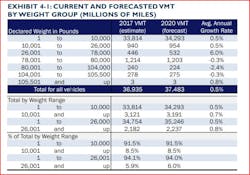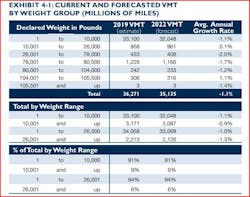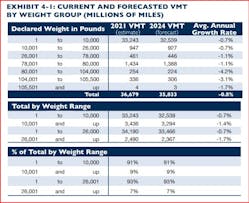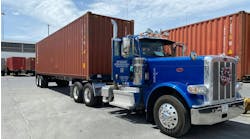Oregon is one of the few remaining states with a weight-mile tax for heavy- and light-duty vehicles. But a new lawsuit filed by the Oregon Trucking Association and several Oregon fleets against state lawmakers and the state’s Department of Transportation claims “motor carriers have been overcharged for road use under the state’s weight-mile tax,” according to OTA’s website.
The 2019-21 Highway Cost Allocation study forecasted that trucks would overpay 3.5% and passenger vehicles would underpay 1.5%. When Jarvis questioned if these differences were enough to consider revising the rates, she was told, “‘Either cars or trucks have to pay 5% or more before we’ll consider any kind of revision to the rates.’”
The 2021-23 Highway Cost Allocation study initially projected that trucks would overpay by 10%. Jarvis said the analysis was done again to ensure this wasn’t an error, and the second study showed that heavy vehicles would overpay by 16% rather than 10%.
“I started talking about what we needed to do to fix that,” Jarvis said. “At the same time, our Department of Transportation started talking about not having enough money for maintenance.”
Since Oregon has the second-most passenger EVs in the U.S., ODOT concluded that the state’s highway maintenance revenue was falling because EVs don’t contribute to the fuel tax.
The 2023-2025 Highway Cost Allocation study expects trucks would overpay by 32.4%. Jarvis wanted to address these overcharges then, but she said, “Nobody wanted to talk about it, and ODOT was complaining about not having enough money, so they pushed it off and said ‘we’ll deal with it when we do a new transportation package in 2025.’ When you look at the numbers, if they wait until the 2025 legislative session, heavy vehicles will overpay in this state in excess of a half a billion dollars.”
When communication with ODOT, lawmakers, and the governor’s office failed, Jarvis said she, the OTA, and Oregon fleets felt their only other option was to file a lawsuit.
Why hasn’t this problem been fixed?
According to Jarvis, this lawsuit didn’t come out of nowhere. It’s been brewing since 2017.
That year, Oregon’s legislature passed House Bill 2017, a transportation funding package. According to Jarvis, this legislation “instructed ODOT to divert most of the additional tax increases into new construction projects, primarily.” These construction projects included the Rose Quarter, I-205, Highway 217, etc. Jarvis told FleetOwner that these construction projects were not fully funded, and tax rates increased 53%.
“We have been historically the most expensive state in the nation for trucking taxes and fees for many, many, many years,” Jarvis said. “And yet, we went ahead and agreed to House Bill 2017 primarily around the ability for us to fix the congestion problems in the Rose quarter… It’s just hugely important to Oregon’s economy. And so that was the piece that we wanted to have fixed the most, and we devoted a penny out of the gas tax increase to pay for the construction project at the Rose Quarter.”
Jarvis claims ODOT underestimated the cost of this project, and money had to be redirected from the Rose Quarter construction to the Abernathy Bridge on I-205. Currently, there is no funding for the Rose Quarter construction, and ODOT is struggling to determine how to pay for these unfinished construction projects.
See also: Samsara files patent lawsuit against rival Motive
What’s the solution?
“They need to roll the rates back,” Jarvis said. “We need to just bite the bullet and get us back into an equitable position in the way we’re being taxed here in the state. And then we’re willing to have a conversation about how we’re taxed.”
Jarvis believes a fuel tax would be the most cost-efficient way to tax vehicles in Oregon, rather than the current weight-mile tax or a fuel tax with a modified VMT.
“But first and foremost, in Oregon, we have to start caring about having roadways and understanding the connection between roadways and economic development in our state, and that seems to be sadly missing here,” Jarvis said.







